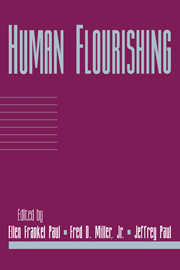Book contents
- Frontmatter
- Contents
- Introduction
- Acknowledgments
- Contributors
- Human Flourishing and the Appeal to Human Nature
- The Three Faces of Flourishing
- Flourishing Egoism
- The Idea of a Life Plan
- Human Flourishing Versus Desire Satisfaction
- Happiness and Human Flourishing in Kant's Ethics
- Valuing Activity
- Ancient Perfectionism and Its Modern Critics
- Aristotle's Elusive Summum Bonum
- Eudaimonism, Love and Friendship, and Political Community
- No Families, No Freedom: Human Flourishing in a Free Society
- Politics, Neutrality, and the Good
- Human Flourishing and Universal Justice
- Index
The Idea of a Life Plan
Published online by Cambridge University Press: 05 October 2013
- Frontmatter
- Contents
- Introduction
- Acknowledgments
- Contributors
- Human Flourishing and the Appeal to Human Nature
- The Three Faces of Flourishing
- Flourishing Egoism
- The Idea of a Life Plan
- Human Flourishing Versus Desire Satisfaction
- Happiness and Human Flourishing in Kant's Ethics
- Valuing Activity
- Ancient Perfectionism and Its Modern Critics
- Aristotle's Elusive Summum Bonum
- Eudaimonism, Love and Friendship, and Political Community
- No Families, No Freedom: Human Flourishing in a Free Society
- Politics, Neutrality, and the Good
- Human Flourishing and Universal Justice
- Index
Summary
En échange de ce que l'imagination laisse attendre et que nous nous donnons inutilement tant de peine pour essayer de découvrir, la vie nous donne quelque chose que nous étions bien loin d'imaginer.
—Marcel ProustINTRODUCTION
When philosophers undertake to say what it is that makes life worth living, they generally display a procrustean habit of thought which the practice of philosophy itself does much to encourage. As a result, they arrive at an image of the human good that is far more controversial than they suspect. The canonical view among philosophers ancient and mod-ern has been, in essence, that the life lived well is the life lived in accord with a rational plan. To me this conception of the human good seems manifestly wrong. The idea that life should be the object of a plan is false to the human condition. It misses the important truth which Proust, by contrast, discerned and made into one of the organizing themes of his great meditation on disappointment and revelation, A la recherche du temps perdu: The happiness that life affords is less often the good we have reason to pursue than the good that befalls us unexpectedly.
The mistake to which I refer has molded the way that philosophy on the whole has dealt with the most fundamental question we ask ourselves, the question of how we are to live our lives. I do not believe that there has been anything inevitable about this development, anything inherent in the philosophical enterprise that has led to the mistaken ideal of a life plan.
- Type
- Chapter
- Information
- Human Flourishing , pp. 96 - 112Publisher: Cambridge University PressPrint publication year: 1999
- 4
- Cited by

